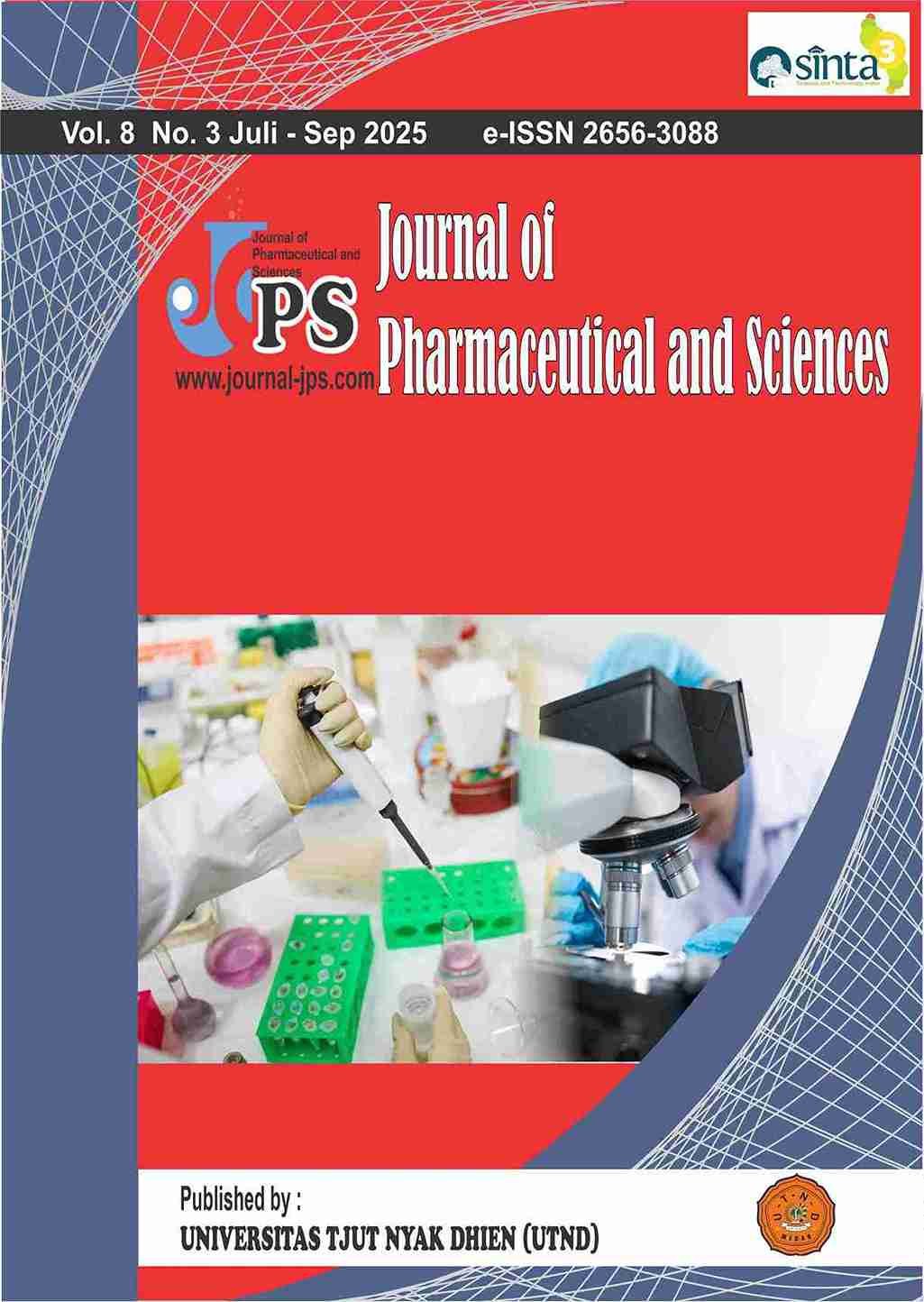The Effect of Counselling on Adherence in Patients with Type 2 Diabetes Mellitus at the Internal Medicine Polyclinic of dr. Ferdinand Lumbantobing General Hospital Sibolga
Main Article Content
Page: 1713-1720
Abstract
Background: Type 2 Diabetes Mellitus (T2DM) is a global health threat with a steadily increasing prevalence. Its treatment is lifelong and requires optimal patient adherence to achieve therapeutic success. Pharmacist counseling is one of the interventions believed to improve such adherence. Objective: This study aimed to analyze the effect of pharmacist counseling and patient characteristics (age, gender, education, occupation, and access to hospital care) on medication adherence among T2DM patients. Methods: This study employed a one-group pretest-posttest design conducted at the Internal Medicine Polyclinic of dr. Ferdinand Lumbantobing Regional Hospital, Sibolga. A total of 75 respondents meeting the inclusion criteria were recruited. Adherence was measured using the MARS-10 (Medication Adherence Rating Scale 10 items) questionnaire before and after the counseling intervention. The Mann-Whitney and Kruskal-Wallis tests were used to analyze the influence of patient characteristics, while the Wilcoxon test was used to analyze the effect of counseling. Results: Analysis of demographic variables such as age, gender, education, occupation, and hospital access showed no significant relationship with adherence either before or after counseling (p>0.05). However, pharmacist counseling was proven to significantly improve adherence. The mean adherence score increased from 6.49 (pretest) to 8.08 (posttest) (p<0.05). The proportion of adherent patients rose from 52% to 94.67% following counseling. Conclusion: Patient characteristics had no significant effect on adherence. Pharmacist counseling was shown to be effective in significantly improving medication adherence among Type 2 Diabetes Mellitus patients.
Downloads
Article Details

This work is licensed under a Creative Commons Attribution-NonCommercial-ShareAlike 4.0 International License.
References
Katzung, B.G., Masters, S.B., Trevor. A.J. Farmakologi Dasar dan Klinik Edisi 12. New York: Mc Graw Hill; 2012.
Kementerian Kesehatan Republik Indonesia. Keputusan Menteri Kesehatan Republik Indonesia Nomor Hk.01.07/ Menkes /603 /2020 Tentang Pedoman Nasional Pelayanan Kedokteran Tata Laksana Diabetes Melitus Tipe 2 Dewasa. Jakarta; 2020
International Diabetes Federation. International Diabetes Federation (IDF) Atlas 10th Edition. In Diabetes Research and Clinical Practice (Vol. 102, Issue 2). Brussel; 2021
Cipolle, R.J. Strand, L.M. Morley, P.C. Pharmaceutical Care Practice. New York: Mc Graw Hill , Health Professions Division; 1998
Kementerian Kesehatan Republik Indonesia. Peraturan Menteri Kesehatan Republik Indonesia Nomor 72 Tahun 2016 Tentang Standar Pelayanan Kefarmasian Di Rumah Sakit. Jakarta; 2016
Bulu, A., Wahyuni, T. D., & Sutriningsih, A. Hubungan Antara Tingkat Kepatuhan Minum Obat Dengan Kadar Gula Darah Pada Pasien Diabetes Melitus Tipe II. Ilmiah Keperawatan 2019; 4(1), 181–189 DOI: https://doi.org/10.37311/jnj.v1i1.2057
Akrom, A., Sari, O. M., Urbayatun, S., & Saputri, Z. Analisis Determinan Faktor-Faktor yang Berhubungan dengan Kepatuhan Minum Obat Pasien Diabetes Tipe 2 di Pelayanan Kesehatan Primer. Jurnal Sains Farmasi & Klinis 2019; 6(1), 54. https://doi.org/10.25077/jsfk.6.1.54-62.2019 DOI: https://doi.org/10.25077/jsfk.6.1.54-62.2019
Sammulia, S.F., Elfasyari, T.Y., Pratama, M.R. Hubungan Karakteristik Pasien Diabetes Melitus dan Tingkat Kepatuhan Minum Obat di Rumah Sakit X Kota Batam. Jurnal Jumantik 2020; Vol. 5 No.2 Juni – Nopember 2020
Rasdianah, N., Martodiharj, S., Andayani, T.M., Hakim, L. Gambaran Kepatuhan Pengobatan Pasien Diabetes Melitus Tipe 2 di Puskesmas Daerah Istimewa Yogyakarta. Jurnal Farmasi Klinik Indonesia 2016; Vol. 5 No. 4, hlm 249–257
Hestiana, D.W. Faktor-Faktor yang Berhubungan dengan Kepatuhan dalam Pengelolaan Diet pada Pasien Rawat Jalan Diabetes Mellitus Tipe 2 di Kota Semarang. Jurnal of Health Education 2017; (2) (2017) 138-145
Bagonza, James., Rutebemberwa, Elizeus., & Bazeyo, William. Adherence to anti diabetic medication among patients with diabetes in eastern Uganda; a cross sectional study. BMC Health Service Research 2015; 15, 1-7. DOI: https://doi.org/10.1186/s12913-015-0820-5
Kassahun, Ashebir., Gashe, Fanta., Mulisa, Eshetu., Rike, Wote Amelo. (2016). Nonadherence andfaktors affecting adherence of diabeteic patients to antidiabetic complication in Assela General Hospital, Oroma Region, Ethiopia, Journal of Pharmacy & BioAllied Sciences 2016
Rahmawati, A., Anggraeni, N.W. Pengaruh Konseling Apoteker terhadap Tingkat Kepatuhan Minum Obat dan Kadar Gula Darah Pasien Diabetes Mellitus. Jurnal Riset Kefarmasian Indonesia 2023; Vol.5 No.1, 2023 181-193. DOI: https://doi.org/10.33759/jrki.v5i1.349
Fatiha, C. N., & Sabiti, F. B. Peningkatan Kepatuhan Minum Obat Melalui Konseling Apoteker pada Pasien Diabetes Mellitus Tipe 2 di Puskesmas Halmahera Kota Semarang. JPSCR: Journal of Pharmaceutical Science and Clinical Research 2021; 6(1), 41. https://doi.org/10.20961/jpscr.v6i1.39297 DOI: https://doi.org/10.20961/jpscr.v6i1.39297
Permatasari, J., Almasdy, D., Raveinal. Pengaruh Konseling Farmasis Terhadap Pengetahuan dan Kepatuhan Pasien HIV/AIDS di Poliklinik VCT RSUP Dr. M. Djamil Padang. Jurnal Sains Farmasi & Klinis 2017; Vol 3 (2), 178-185 DOI: https://doi.org/10.29208/jsfk.2017.3.2.79
Departemen Kesehatan Republik Indonesia. Pedoman Konseling Pelayanan Kefarmasian di Sarana Kesehatan. Jakarta; 2007





